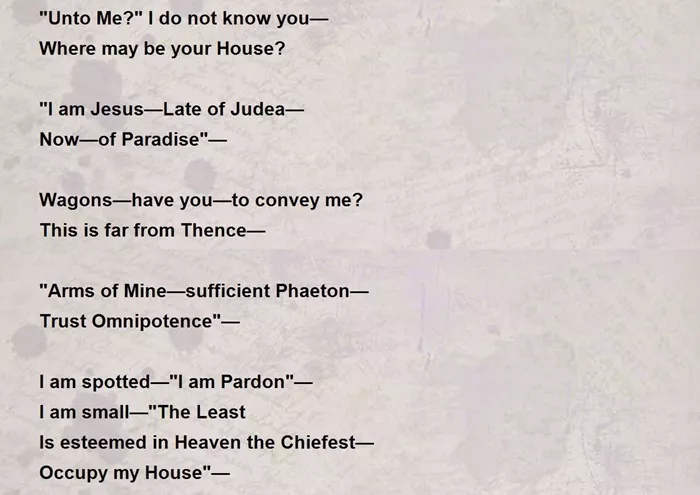Welcome to Poem of the Day – Unto Me? I Do Not Know You by Emily Dickinson.
Emily Dickinson, one of America’s most celebrated poets, has a unique way of exploring themes of identity, relationships, and the human condition. Her poem “Unto Me? I Do Not Know You” is a wonderful example of her ability to weave complex emotions into simple, yet powerful language. This article will break down the poem and offer an explanation of its deeper meaning.
Unto Me? I Do Not Know You Poem
“Unto Me?” I do not know you—
Where may be your House?
“I am Jesus—Late of Judea—
Now—of Paradise”—
Wagons—have you—to convey me?
This is far from Thence—
“Arms of Mine—sufficient Phaeton—
Trust Omnipotence”—
I am spotted—”I am Pardon”—
I am small—”The Least
Is esteemed in Heaven the Chiefest—
Occupy my House”—
Unto Me? I Do Not Know You Explanation
The Opening Lines
The poem begins with the line, “Unto me? I do not know you.” This statement immediately sets the tone of distance and unfamiliarity. Dickinson’s choice of words suggests that the speaker is addressing someone who is not well known to them, perhaps a stranger or even an individual from the past whom they no longer recognize. The phrase “Unto me” implies a direct communication, as if the speaker is responding to an invitation or challenge. However, the words that follow express confusion or even rejection of that connection.
The Conflict: A Desire for Understanding
As the poem unfolds, the speaker seems to grapple with the idea of connection and understanding. Dickinson often explored themes of isolation, and here, the speaker questions the identity of the person they are being asked to engage with. The sense of not knowing someone is not just a simple statement of fact; it hints at a deeper yearning for understanding, for a meaningful bond that has yet to be established.
The Use of Personal Pronouns
In this poem, Dickinson makes frequent use of personal pronouns, particularly “I” and “you,” which create a conversation between the speaker and the person they address. This usage highlights the inward focus of the poem, drawing attention to the speaker’s own feelings of uncertainty. It becomes clear that the speaker is not necessarily rejecting the person in question but rather reflecting on their own emotional state and inability to recognize them. The pronouns also emphasize the gap between the speaker and the other, strengthening the theme of emotional or physical distance.
The Poem’s Emotional Undertones
The poem carries a sense of ambiguity that is characteristic of Dickinson’s work. While it initially seems to express rejection or confusion, there is also a layer of doubt. The speaker questions their own capacity for recognition or understanding, which could point to an internal struggle rather than a clear external conflict. Dickinson’s use of punctuation and dashes, typical of her style, creates pauses that make the reader reflect on the complexity of the emotions being described.
The Underlying Theme
One of the central themes in this poem is identity. The speaker’s response to the unknown person suggests that their sense of self is tied to their ability to recognize others. The inability to recognize someone could symbolize a loss of connection, or it could be an expression of the speaker’s own struggle to understand who they are. Dickinson often explored the idea that the self is constantly evolving, and the disconnection in this poem may reflect a moment of personal transformation or doubt.
Conclusion
In “Unto Me? I Do Not Know You”, Emily Dickinson crafts a poem filled with emotional depth and mystery. Through the speaker’s confusion and rejection of an unknown individual, Dickinson delves into themes of isolation, identity, and self-reflection. The poem raises important questions about the nature of relationships, both with others and with ourselves. Ultimately, Dickinson leaves the reader with a sense of unresolved tension, asking us to ponder our own connections and the moments when we, too, might find ourselves asking, “Unto me? I do not know you.”
This poem is a beautiful example of Dickinson’s ability to explore complex human emotions with minimal words, creating a lasting impact on the reader. Through its simplicity, the poem speaks to the universal experience of questioning who we are and how we relate to the world around us.

